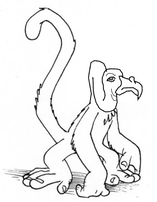 Often, idioms act as advice. It should be no surprise that multiple cultures might have the same things to say to future generations. This week’s post takes a look at one English idiom as stated in five other languages. The English idiom of the day is You can’t make a silk purse out of a sow’s ear. Below are three lists: -each idiom loosely translated into English -the languages from which each idiom hails, & -each idiom in its original tongue However, I’ve changed up the order in each list. Your task is to match each translated idiom with its original language & original wording: A. You can’t turn a buzzard into a sparrowhawk. B. A monkey in silk is still a monkey. C. To celebrate a wedding with dried figs. D. Even if the monkey wears a golden ring it remains ugly. E. If you’re born to crawl you can’t fly. 1. Dutch 2. Italian 3. Spanish 4. French 5. Russian I. fare le nozze con I fichi secchi II. rozhdennyj polzat letat ne mozhet III. aunque la mona se vista de seda, mona se queda IV. al draagt een aap een gouden ring, het is en blijft een V. on ne peut faire d’une buse un épervier Before checking the first comment in the comment section, make a list of your corresponding letter, Arabic number & Roman numeral. Then, in the comments section let us know how well you did & what you have to say about sow’s ears, or silk-wearing monkeys, or maybe even dried figs. My thanks go out to this week’s sources: Translate.net, Adam Jacot de Boinod’s Toujours Tingo, & Learning English with Idioms
9 Comments
 Idioms abound, yet they usually have shaky or completely untraceable origins. Hard-working word-sleuths have uncovered the origins of only a fraction of English idioms. Here are a few. Point blank – the term appears to come from French, point blanc, a term in which the blanc refers to the white circle in the center of a target & point means exactly that. Slush fund – The masts of sailing ships were once maintained by rubbing slush into the wood. This slush was the waste grease from the galley. After a ship’s masts were happily greased, the cook could sell the remaining grease, which put money in his pocket – money he could spend however he liked, his slush fund. Dull as dishwater – Oddly, this is a fishing term. Fishing in a pond, river, lake or bay wasn’t dull at all, but fishing in a ditch rarely produced a fish, & was therefore, tedious. The idiom appears to originally have been dull as ditchwater, or dull as fishing in ditch water. In time, it changed to the idiom we know today. Nick of time – During the Middle Ages, attendance at church and university was taken by carving tally marks, or nicks, in a piece of wood. Those who arrived on time received a nick. It’s intriguing that we don’t refer to those arriving late as nickless, nick-free, or unnicked. Pillar to post – Criminals were once either pilloried or tied to a post and whipped. The even less fortunate were dragged from one of these two forms of torture to the other, sometimes multiple times. In time, from pillory to post morphed into from pillar to post. Peeping Tom – apparently when the famous (or infamous) Lady Godiva rode through the streets without a stitch on, the one chap who ogled her & got caught doing so was named Tom. Some sources suggest that neither Tom’s peeping nor his punishment (going blind) was part of the original tale, but at least w ended up with this idiom. Good readers, which of these idiom origins do you find most remarkable? Please leave your thoughts in the comments section. My thanks go out to this week’s sources: Phrase Finder, Etymonline, the OED, & Jordan Almond’s Dictionary of Word Origins. 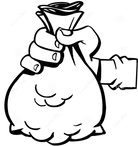 Idioms allow us to communicate clearly even while using words that have nothing to do with our meaning. My American Idioms Dictionary, for instance, lists twenty-one idioms beginning with the word leave, covering the better part of two pages. Oddly, most idioms’ origins are shaded in mystery. Three of the six idiom sources below are legitimate. Three are manufactured. See if you can determine the faux origins (answers are in the comments section). Leave someone holding the bag (1700s) This idiom comes from a hazing game much like a snipe hunt, in which a gullible individual is sent up into the hills with a bag while his/her tormenters claim they’ll drive the elusive snipe out of the bushes & into the bag, but instead, have a good laugh at the expense of their innocent victim. Leave someone high & dry (1700s) When a ship was run aground or caught on land due to a dropping tide, it was left high and dry. Leave no stone unturned (1700s) Based on the behavior of a North American bird, the ruddy turnstone, which is surprisingly diligent in its efforts to turn over stones to find food. Leave well enough alone (1400s) The old Scottish game Twibbits involved flipping discs, the goal being to place one’s disc as far from others’ discs as possible, yet near the goal. The winner was said to be left alone, but if two throws tied, the round was judged well enough alone, a term equal to our modern good enough. Leave someone in the lurch (1500s) This idiom has its origins in a French cribbage-like game called lourche in which a player was said to be left in the lurch when s/he was put in a hopeless position. Leave someone out in the cold (1500s) When the portcullis of a castle or other fortified building was lowered at dusk, members of the household were sometimes left out in the cold. Please consider which three seem most authentic, then check answers in the comments section & let us all know how you did. My thanks go out to this week’s sources: OED, Phrase Finder, NTC’s American Idioms Dictionary, & Etymonline 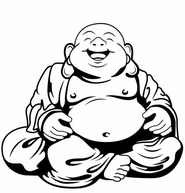 In these troubled times, we could all use some laughter. So here's a look into words and idioms related to laughter. What’s funnier than a pun? Entering the language in 1826, the funny-bone is exactly that. Not only does a good whack on the elbow make us feel funny, the elbow is positioned at the end of the humerus. Ha! And again I say Ha! When we try a joke that doesn’t have the desired affect, we refer to this as laying an egg. This term was born in the late 1800s. Its origin is due to the fact that hens make a big deal of laying an egg, with much squawking & clucking, though their peers appear unimpressed. In the 1570s the word corny came to English from the Sanskrit word jirna, which meant old & worn out. Corny can mean old fashioned, mawkish & sentimental, uncool due to a failed attempt at coolness, trite, or an attempt at humor that falls flat. The word comedy entered English in the late 1300s, through French from the Greek komodios, meaning village singer. Though the village singer might have sung any sort of song, somehow the funny ones have lived on etymologically. Centuries ago when Romans were doing what Romans did, that included plowing the fields. When a farmer was unable to plow in a straight line, his work was referred to as de lire, meaning off track, out of line. In the 1590s this Latin term made its way into English as delirious & delirium, as someone experiencing delirium is off-track and has a tough time returning the old plow to the furrow. This next one isn’t really about a laughter-related word, but I’m including it because upon reading this etymology, I laughed. In the sport of horse-racing, skittish horses can often be calmed by placing a goat in their stall (who knew?). In the early 1900s, nefarious jockeys would steal their opponent’s horse’s calming goat in hopes of increasing the edginess of the opponent’s horse while increasing the likelihood the nefarious jockey might win. This practice gave birth to the idiom getting one’s goat. In the 1630s, the term happy as a clam in the mud at high tide found its way to English. Our modern version has been truncated to happy as a clam, & has lost two salient bits, as the big idea of the idiom was that a clam in the mud at high tide could not be harvested & was therefore, happy. In the 1630s, English speakers began using the term sardonic laughter to refer to laughter that wasn’t genuine and might seem a bit stretched. This comes from a Greek term that defined the twitchy, stretched-smile symptoms people displayed after eating a particular plant from Sardinia. The symptoms generally ended in death. On a nearly lighter note, the idiom tickled to death comes from a myth regarding a method of torture said to have been used in China. Better than dying from eating a Sardinian plant, but still, not a great way to go. Any giggles, titters or guffaws? My thanks go out to this week’s sources: OED, Etymonline, & Wordnik, & Jordan Almond’s Dictionary of Word Origins  This week we’ll bark up the tooth tree. Big thanks again to my dear friend River, who inspired last week’s eyetooth post in the first place. Tooth gave birth to all sorts of great words & idioms. Sweet-tooth showed up as early as the 1300s. Bucktoothed showed up in the 1540s. Snaggle-toothed appeared in the 1580s. To be long in the tooth appeared in 1841. The fabric we call houndstooth showed up in the early 1900s. The word toothache has been in use since Old English, toothpick showed up in the 1400s, & toothbrush found its way into the language in the 1600s. Tooth has been with us since Old English, It was born of the Proto-Indo-European word dent-. Yes, both dental & tooth have the same root, but along the way different languages & cultures heard the sounds differently & morphed them differently, ending up with words that don’t sound vaguely related. Given tooth’s roots (sorry about that), it should be no surprise that the following words are related to tooth: trident (1400s) three teeth indent (1400s) to give something a jagged or toothed appearance dandelion (1400s) literally tooth of the lion indenture (1400s) of the raggedy edge – when the practice of indentured servitude began, the contract between “employer” & “employee” would be ripped in half in a toothed or jagged fashion, each piece going to one of the parties. Years later, the two pieces were compared as proof of identity so that the contract’s agreement could be fulfilled. dentist (1700s) tooth person periodontal (1800s) around the teeth orthodontia (1800s) straight & proper teeth denture (1800s) set of teeth mastodon (1800s) Okay, so we usually dig up bones & teeth of old critters, right? Apparently each mastodon molar was equipped with a central bump, & apparently our intrepid, lonely, mostly male paleontologists were a bit too lonely (& worked up) so voila! breast-teeth. rodent (1800s) you don’t want to know the details, but they have to do with scraping, red, & teeth al dente (1900s) to the tooth Tusk appears to have made its way to Old English through Old Frisian, also from the Proto-Indo-European root dent-. What toothsome etymology do you find most worth of biting into? Please leave a comment. My thanks go out to this week’s sources: Merriam Webster, OED, Etymonline, & Wordnik  Some time ago my dear friend River asked about the idiom I’d give my eyeteeth for… To my surprise, information about its origins are scarce, but there sure is a heap of information about related words. It seems the idiom to give one’s eyeteeth… has been around since 1836 or earlier. Eyeteeth are generally referred to as canines, those pointy ones directly beneath the eyes. Some etymologists submit that the extraction of the eyeteeth is more painful than the extraction of other front teeth (due to very long roots), suggesting the meaning I’d take some pain for… Others connect it with some earlier eyeteeth idioms: to cut one’s eyeteeth, which refers to a person growing up from babyhood to childhood, to draw the eyeteeth out of someone, which meansto pull the conceit out of someone, & to have one’s eyeteeth, which means to be fully conscious. If the idiom in question grew out of any of these, it could mean I’d give up my youth for…, I’d become humble for…, or I’d give up my consciousness for… Do any of these resonate for you? Why? Please weigh in on this in the comments section. Figuring highly in the eyeteeth idioms is the word eye, which takes up four full pages of the OED (Oxford English Dictionary) and is followed by another four pages of eye-related words. A few of these related words are eyeable, eyeleteer, eyebree, eyethurl & eyey (no kidding). Please ponder possible meanings before reading on… Eyeable appeared in English in 1839 and has two meanings: that which can be seen with the naked eye or an item that can be looked upon with pleasure. An eyeleteer is a stabbing implement one uses for making eyelets – something like an awl. This word came to the language in 1874. Eyebree entered the language as early as 1000. It means eyelid & is the grandmother of our modern word, eyebrow. Many modern homes are equipped with an eyethurl, which came to English in 890. An eyethurl is that tiny eye-sized window in some front doors. In 1884 the word eyey was born. It means full of eyes. One must wonder what context required the invention of the word. Critters approaching a fire at night? Bats in the belfry? Very old potatoes? What proposed eyeteeth idioms resonate best for you? What brilliant possible meanings did you image for the related eye words? Please leave a comment. My thanks go out to this week’s sources: Collins Dictionary, OED, Etymonline, & Wordnik  The English word head has its unlikely origins in the Proto-Indo-European word kaput. Somehow, as kaput made its centuries-long voyage through German, Dutch, Saxon and/or Frisian to Old English, it morphed to heafod. From Old English it moved into Middle & Modern English, where it managed to drop a syllable & become head. Along the way it collected dozens of idioms, including: 1200s – head count (applied to people) 1300s – headwaters 1300s – headstrong 1500s – head count (applied to cattle) 1680s – head of a coin 1680s – head on a mug of bear 1748 – head on a ship (toilet) 1911 – hophead, which became in time, pothead 1952 – heads up 1972 – head game 1984 – headbanger & dozens more. Because head has changed so much since it started out as kaput, it has a steaming heap of unlikely cousins, all from that same Proto-Indo-European root. Here is a sampling: capital caput madcap cabbage capo chief scalp cap capsize chef captain cob achieve capillary cadet decapitate cape cephalic mischief precipice handkerchief corporal chieftain capitulate Many connections to the head are obvious. Others, not so much. Might any of you have a hare-brained theory as to how some of these words are related to the head? Please leave your thoughts in the comments section. My thanks go out to this week’s sources: OED, Etymonline, Collins Dictionary, & Wordnik  When reading through a list of idioms I can’t keep myself from chuckling. Here’s a list cooking- or eating- related idioms with no notes regarding definitions or origins. I have hopes it will inspire a chuckle or two: spill the beans not worth a hill of beans full of beans to not know beans bean counter too many cooks spoil the broth out of the frying pan & into the fire cry over spilt milk not one’s cup of tea done to a T cook up a storm cook to perfection burn to a crisp half baked grist for the mill the pot calling the kettle black to bite off more than one can chew to bite that hand that feeds one eat crow eat dirt eat humble pie eat like a bird eat like a horse eat high on the hog eat one’s hat eat one’s heart out eat one’s words easy as pie that takes the cake a piece of cake icing on the cake have one’s cake & eat it too Dear readers – any chuckling? If so, what idiom(s) got you going? My thanks go out to this week’s sources: the OED, Etymonline, & The Idiom Connection 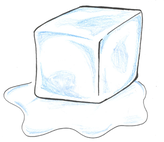 This week’s post is in honor of my loving wife, Ellen, who introduced my temperature-insensitive self nearly 30 years ago to her unique take on words used to label cooler temperatures. Nippy she sees as a non-threatening coolishness, one that inspires rosy cheeks & connotes fun & frivolity, yet still requires a sweater. Nippy entered the English language in 1898, & has a vague association with the idiom, “a biting chill in the air.” Nippy comes from the word nip, which came to the language in the 1300s from Germanic sources, meaning to pinch sharply or bite suddenly. Just down the thermometer on Ellen’s scale of coolness is chilly, a level of coolness that calls for serious layering. Chilly showed up in the 1560s from the noun chill, which came from a Proto-Indo European word meaning cold, through the Old English word ciele or cele. Interestingly, for two centuries, from the 1400s through the 1600s the word chill eclipsed the word cold in English usage. Since the 1600s, cold is most English speakers’ go-to word when the temperature drops. Next on Ellen’s scale of coolness is brisk, which connotes consistent discomfort & very little hope in sight for warming. Ellen tries to reserve brisk for truly uncomfortable situations. Brisk came to English through Scottish (bruisk) in the 1550s. The Scots got it from the French word brusque which meant lively, fierce, sharp, & tart. In Ellen’s scale of coolness, the word cold is to be avoided at all costs, as it suggests all hope is lost. For academic purposes, I have included this ever-so-sad & hope-sucking word. Read on if you are strong. Cold comes from Germanic sources (cald, ceald, kalt, kaldr, kalds, & more) and appeared in English in the 900s. These words came from the Proto-Indo-European word gel- or gol-, which through other branches of the etymological tree gave birth to gelatin, glass & glacier. Some cold idioms include: Catch cold - 1200s Cold-blooded - 1590s Cold-hearted - 1600 Cold shoulder - 1816 Cold feet - 1893 Cold turkey - 1910 Cold war - 1945 Also of interest, the word cool once had the form coolth. For reasons unknown, though warm held onto the alternate form warmth, cool lost its alternate form coolth. What have you to say about Ellen’s scale of coolness? Or about any of the words above? My thanks go out to this week’s sources: Merriam-Webster, the OED, Etymonline, & Wordnik 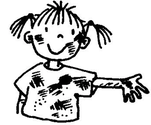 The word dirt came to English through Middle English (drit or drytt, which meant mud, dirt or dung) originating in the Norse word, drit. Back in the 1300s it was also used figuratively to make fun of people. The word dirty was born some two centuries later (originally dritty to match its Middle English kin). Though dirty originally meant muddy, dirty or dung-covered, by the 1590s it had grown to also mean smutty or morally unclean. When compared with its synonym soil, dirt is one of the myriad words that reflects a prejudice against Germanic, Anglo-Saxon & Norse terms in favor of Latin and Greek (due in part to the events following the Battle of Hastings). We English speakers generally consider soil (from the Latin word solium or solum) to be a classier person’s term for that lowly, horrible word dirt. I have a fascination with this prejudice & expound on it here. But, back to dirt. In the 1670s, English speakers could pull dirty tricks on one another. By 1764, we could ask someone to do our dirty work. By 1821 the term dirt cheap was born. In the 1850s the mining trade gave us the literal term paydirt. By 1873 that term had become figurative, meaning profit or success. It wasn’t until 1926 that dirt picked up the meaning gossip, This usage was introduced by none other than Ernest Hemingway. Though dirty looks have been going on for centuries, we didn’t call them that until 1926. And in 1932 the term dirty old man was born, to be artfully portrayed by Arte Johnson as Tyrone F. Horneigh a mere 40 years later. Please, good followers, leave a thought regarding Tyrone F. Horneigh & his unrequited love for Gladys Ormphby, or maybe say something about dirt. My thanks go out to this week’s sources: Collins Dictionary, the OED, Wordnik, & Etymonline. |
I write for teens & tweens, bake bread, play music, and ponder the wonder of words in a foggy little town on California's central coast.
To receive weekly reminders of new Wordmonger posts, click on "Contact" & send me your email address. Archives
November 2023
|


 RSS Feed
RSS Feed